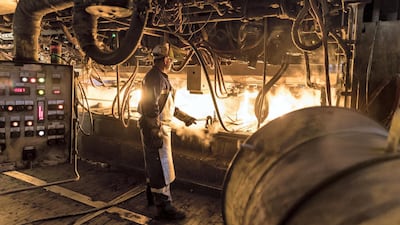Hydrogen growth plans by the oil-exporting countries in the GCC could reap as much as $100 billion a year by 2050, according to a report by Columbia University and Qamar Energy.
The UAE and Saudi Arabia are advancing plans to produce blue and green hydrogen, leveraging existing hydrocarbon relationships to sell newer, cleaner forms of energy.
Green hydrogen is produced from renewable-powered electrolysis, while blue hydrogen is generated through steam methane reformation. Interest in hydrogen is gathering pace because it is viewed as an alternative transportation fuel and can power fuel cells in zero-emission vehicles, along with the high efficiency of fuel cells. Hydrogen can also run in modified internal combustion engines and can be used in manufacturing as an alternative to fossil fuels. Countries around the world are also considering blending hydrogen into e-fuels for aviation.
A conservative scenario for the growth of low-carbon hydrogen could lead to GCC countries meeting up to 10 per cent of European and East Asian requirements by 2050. The region could generate between $30bn and $40bn in annual revenues from sales up to about 20 million tonnes of hydrogen.
A more ambitious target could mean GCC countries providing 30 per cent of demand in Europe and East Asia. Export volumes could reach 50 million tonnes, generating between $80bn and $100bn in annual revenues, the report said.
Gulf oil exporters have already targeted sales of blue hydrogen to countries such as Japan, with Abu Dhabi National Oil Company signing three agreements to sell the cleaner fuel.
"The UAE priorities have to be defined. At the moment, a strong market pull for low-carbon hydrogen and related materials is emerging from Europe and Japan in particular," the report said.
Hydrogen could also be used in the domestic market as regional countries look at continued decarbonisation across various sectors.
"Low-carbon hydrogen represents a potential route to decarbonise domestic industry and to create new export streams, whether hydrogen directly, or hydrogen-derived industrial materials such as ammonia, plastics, synthetic fuels and steel," according to the report.
UAE companies, such as Emirates Steel, one of the largest companies in the country outside the oil sector, are looking to tap green hydrogen for manufacturing.
Hydrogen is being used as a reducing agent in steel production, replacing the more polluting coal, which countries around the world are seeking to phase out.
"To align with decarbonisation targets elsewhere, and measures such as an EU carbon border tariff, decarbonised materials (such as steel and ammonia) can be produced for export," the report said.
"As it already has with aluminium, the UAE could leverage competitive local low-carbon energy resources and preferred costs to become a leading international supplier of steel, chemicals and other hydrogen derivatives," it said.
On Tuesday, Abu Dhabi National Oil Company said it was looking to become a top exporter in blue hydrogen.
"Already at Adnoc, we produce about 300,000 tonnes of hydrogen a year," Dr Sultan Al Jaber, managing director and group chief executive of the state-owned oil company told an industry event on Tuesday.
"By leveraging our existing gas infrastructure and commercial-scale CCUS [carbon capture utilisation and storage] capabilities, the UAE can and will become a major player in the emerging blue hydrogen market," said Dr Al Jaber, who is also the UAE Minister of Industry and Advanced Technology.
This year, Adnoc, Mubadala and holding company ADQ formed an alliance for the development of green and blue hydrogen.


